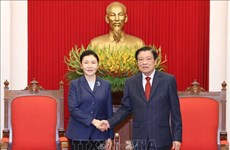VN, Switzerland seek stronger cooperation
Switzerland will continue to promote cooperation with and provide
assistance for Vietnam in the fields of finance, banking, foodstuff,
pharmacy, industry and cement, a Swiss official has said.
Switzerland will continue to promote cooperation with and provide
assistance for Vietnam in the fields of finance, banking, foodstuff,
pharmacy, industry and cement, a Swiss official has said.
The Head of the Swiss Federal Department of Economic Affairs, Johann Schneider-Ammann, made the affirmation during his talks with visiting Vietnamese Deputy Prime Minister Hoang Trung Hai in Bern on Sept. 13.
At the talks, the two sides reached consensus on a number of major orientations and concrete measures to boost bilateral ties, especially in trade, investment, finance and banking.
Vietnam always attaches importance to and wants to boost the traditional friendship and multifaceted cooperation with Switzerland, said Hai, who is on a six-day official visit to Switzerland beginning Sept. 10, which lands on the 40th anniversary of Vietnam-Switzerland diplomatic relations.
The host and guest held that the two nations still hold great potentials for further cooperation in investment and trade.
The officials also pledged to support and encourage businesses from both countries to boost exchanges, explore information and set up stable, long-term business relations in each other’s market.
Hai said Vietnam will continue stepping up its renewal and international integration process, and is determined to surmount its current economic difficulties to become a modernity-oriented industrialised nation by 2020.
After the talks, Hai and Johann Schneider-Ammann witnessed the signing of a memorandum of understanding (MoU) on cooperation between the Vietnamese Ministry of Foreign Affairs and the Swiss Federal Department of Foreign Affairs, an MoU on technical assistance and capacity building for the Vietnamese Finance Ministry, an MoU on cooperation in labour and jobs and a project to improve the treatment of waste water and solid waste in Vietnam’s towns.
The same day, a seminar on finance and banking took place in Bern, with the participation of many Swiss leading financial and banking experts. Inflation control, finance supervision, forecasting and monetary policy building topped the agenda at the seminar./.
The Head of the Swiss Federal Department of Economic Affairs, Johann Schneider-Ammann, made the affirmation during his talks with visiting Vietnamese Deputy Prime Minister Hoang Trung Hai in Bern on Sept. 13.
At the talks, the two sides reached consensus on a number of major orientations and concrete measures to boost bilateral ties, especially in trade, investment, finance and banking.
Vietnam always attaches importance to and wants to boost the traditional friendship and multifaceted cooperation with Switzerland, said Hai, who is on a six-day official visit to Switzerland beginning Sept. 10, which lands on the 40th anniversary of Vietnam-Switzerland diplomatic relations.
The host and guest held that the two nations still hold great potentials for further cooperation in investment and trade.
The officials also pledged to support and encourage businesses from both countries to boost exchanges, explore information and set up stable, long-term business relations in each other’s market.
Hai said Vietnam will continue stepping up its renewal and international integration process, and is determined to surmount its current economic difficulties to become a modernity-oriented industrialised nation by 2020.
After the talks, Hai and Johann Schneider-Ammann witnessed the signing of a memorandum of understanding (MoU) on cooperation between the Vietnamese Ministry of Foreign Affairs and the Swiss Federal Department of Foreign Affairs, an MoU on technical assistance and capacity building for the Vietnamese Finance Ministry, an MoU on cooperation in labour and jobs and a project to improve the treatment of waste water and solid waste in Vietnam’s towns.
The same day, a seminar on finance and banking took place in Bern, with the participation of many Swiss leading financial and banking experts. Inflation control, finance supervision, forecasting and monetary policy building topped the agenda at the seminar./.













